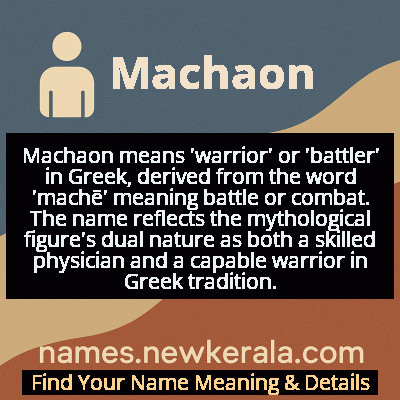Machaon Name Meaning & Details
Origin, Popularity, Numerology Analysis & Name Meaning of Machaon
Discover the origin, meaning, and cultural significance of the name MACHAON. Delve into its historical roots and explore the lasting impact it has had on communities and traditions.
Name
Machaon
Gender
Male
Origin
Greek
Lucky Number
1
Meaning of the Name - Machaon
Machaon means 'warrior' or 'battler' in Greek, derived from the word 'machē' meaning battle or combat. The name reflects the mythological figure's dual nature as both a skilled physician and a capable warrior in Greek tradition.
Machaon - Complete Numerology Analysis
Your Numerology Number
Based on Pythagorean Numerology System
Ruling Planet
Sun
Positive Nature
Leaders, ambitious, highly driven, self-reliant, innovative.
Negative Traits
Overly aggressive, domineering, impatient, selfish.
Lucky Colours
Red, orange, gold.
Lucky Days
Sunday.
Lucky Stones
Ruby, garnet.
Harmony Numbers
2, 3, 9.
Best Suited Professions
Entrepreneurs, managers, engineers.
What People Like About You
Courage, determination, leadership.
Famous People Named Machaon
Machaon of Thessaly
Mythological Physician and Warrior
Legendary healer in Trojan War who treated Greek heroes and combined medical expertise with combat skills
Machaon (Historical Figure)
Ancient Greek Physician
Historical physician mentioned in ancient texts who practiced advanced surgical techniques
Machaon of Cos
Medical Practitioner
Continued the healing traditions of the Asclepiad medical school on the island of Cos
Name Variations & International Equivalents
Click on blue names to explore their detailed meanings. Gray names with will be available soon.
Cultural & Historical Significance
The cultural impact of Machaon continued through the classical period, where he was venerated as a hero and his descendants were believed to have established important medical traditions. Various Greek city-states claimed descent from Machaon or his brother Podalirius, and the Asclepiad medical schools traced their lineage back to these mythological healers. This connection between myth and actual medical practice demonstrates how the Greeks used mythological figures to legitimize and inspire real-world professions. Machaon's legacy represents the Greek ideal of balanced excellence and the integration of different forms of knowledge and skill.
Extended Personality Analysis
Individuals bearing the name Machaon typically exhibit a remarkable balance of strength and sensitivity, reflecting the mythological figure's dual nature as both warrior and healer. They tend to be calm under pressure, methodical in their approach to problems, and possess strong analytical abilities that allow them to assess situations quickly and accurately. Machaon personalities often demonstrate natural leadership combined with deep empathy, making them effective in crisis situations where both decisive action and compassionate care are required. Their problem-solving approach is typically evidence-based and practical, yet they maintain the courage to make difficult decisions when necessary.
These individuals usually value knowledge and continuous learning, particularly in fields where they can apply their skills to help others. They often excel in professions that require both technical expertise and interpersonal skills, such as medicine, emergency services, or leadership roles. The name suggests someone who bridges different worlds—combining intellectual rigor with practical capability, theoretical understanding with hands-on application. Machaon personalities are often perceived as reliable, competent, and deeply principled, with a strong sense of duty and service to others. They typically command respect through their demonstrated competence rather than through authority alone.
Modern Usage & Popularity
In contemporary naming practices, Machaon remains an uncommon but meaningful choice, primarily selected by families with strong connections to Greek culture or those with particular interest in classical mythology. The name has seen modest usage in Greece and among Greek diaspora communities, though it has never achieved widespread popularity. Modern parents who choose this name typically appreciate its historical significance, classical roots, and the positive attributes associated with the mythological figure. The name appeals to those seeking a distinctive classical name that carries substantial cultural weight without being overused. In recent years, there has been a slight increase in its usage alongside growing interest in mythological and historical names, though it remains well outside mainstream naming trends. The name is particularly favored by medical professionals, classical scholars, and parents who value names with strong educational and cultural significance.
Symbolic & Spiritual Meanings
Machaon symbolizes the powerful integration of contrasting qualities: the strength of a warrior with the compassion of a healer. He represents the ideal of comprehensive service—both protecting through strength and restoring through knowledge. The name carries deep symbolic meaning related to wisdom in crisis situations, the practical application of specialized knowledge, and the balance between decisive action and careful consideration. Symbolically, Machaon embodies the concept that true healing often requires understanding the nature of harm, and that the most effective caregivers may be those who have witnessed or participated in conflict. His legacy suggests that the highest forms of excellence involve mastery across multiple domains, and that the most valuable contributions to society often come from individuals who can navigate different aspects of human experience with equal competence and compassion.

